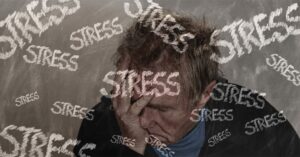We know what massive consequences stress can have, and yet a lot of people are not capable of spotting it in themselves or others. Here you will receive a couple of tips on how to spot stress early and learn more about what you can do.
In a perfect world, we would all take good care of ourselves and each other, and an employer would have a clear plan of action for what to do if we experience stress in the workday. However, the reality is still far from this scenario, and therefore you have joint responsibility for yourself and your surroundings.
You should know who is at risk to suffer from stress, and you should know what you can do if a colleague is at risk of stress.
10 industrial psychologists from KLAUSEN have done endless counselling sessions with stress-affected employees. This is their estimate for what you should know and notice to become better at identifying and reacting to stress.
Who is affected?
We tend to believe, that those who seem strong, ambitious, and hard-working will not suffer from stress. This is not true. The vulnerable and extroverted are often better at communicating how they feel, and they will naturally start the conversation they need to process stress.
Those at risk of being stressed will live up to one or more of the following points:
- Living through the job. Those who have a strong identification with the job and build their lives around it. It makes them very vulnerable if there are challenges at work
- Takes a great level of responsibility. Those who want to do their job perfectly are ambitious and take their work very seriously. They can usually solve both their own and others’ problems
- Turns things inward. They are persistent and seem not to be touched by change or busyness. They do not respond and communicate about their challenges and they can therefore go for a long time with stress symptoms without their surroundings noticing.
Consider whether you or any close colleague fits the points above. Then move on to the next section.
Communication and stress
Changes in communication or lack of communication may indicate stress. Communication is closely linked to stress and we will often start communicating differently if we become stressed.
The following communication signals may be signs of stress:
- They become worse at communicating and begin to communicate less
- They signal (consciously / unconsciously) that they have no surplus to deal with the challenges of others
- They overreact to tasks and other things that they would not otherwise respond to
- They often misunderstand what others are saying. What is expected of a particular task, humour or similar situations
Consider whether there are any of the above that suit any of your colleagues. Have you noticed a change?
What can you do?
Basically, stress is a problem because we go with it for far too long without it being processed. What you can do in your everyday life is to help create a culture that has a positive effect on stress levels. If there is someone you are worried about, the best thing you can do is to help create an open and constructive dialogue. Make sure you involve colleagues who may need it.
- Talk about things. Speak from your own perspective, tell how you experience work and everyday life. It opens up for others to share similar experiences and perspectives.
- Show interest. Ask about how others handle everyday life, how they feel about change, how they structure their day, or how they make sure to relax in the evenings and on weekends.
- Set frames. Help set the framework for what you and your colleagues are responsible for.
- Procedure. Make sure you know what the procedure is for stress in the company, whom to go to and what the process is. Use that knowledge if it becomes relevant.
Work-life must not make us sick and we have a responsibility to ourselves and our surroundings. Remember that you and everyone else are imperfect humans in an imperfect world. If our colleagues withdraw from communities or start communicating less, we need to stick to communication. We must have a productive and positive everyday life, where we feel good, and that requires us to be there for each other, talk to each other and inspire each other.
Who does not get stressed?
When we talk about stress, we must remember that, unless there is something completely wrong, then everyone can live a healthy work-life without stress. Those who manage it handle their challenges in everyday life on an ongoing basis and therefore avoid a high level of stress over a long period of time. They are characterized by the following:
- They do not experience anything as threatening or dangerous, but rest in their role and their contribution at work and their private lives
- They do not see change as a problem, but a transition from one stable situation to another.
- They reach the goal of their work and their role is clearly defined. They are aware that there is no benefit or reason to exceed the goals.
- They view their work as a well-defined part of life. Outside of work, they have personal projects and relationships that define who they are and give them stability.
Stress is a serious problem and many who are at risk of stress fail to create the stability they need. Stress is not something you handle yourself, but something you need help with.




